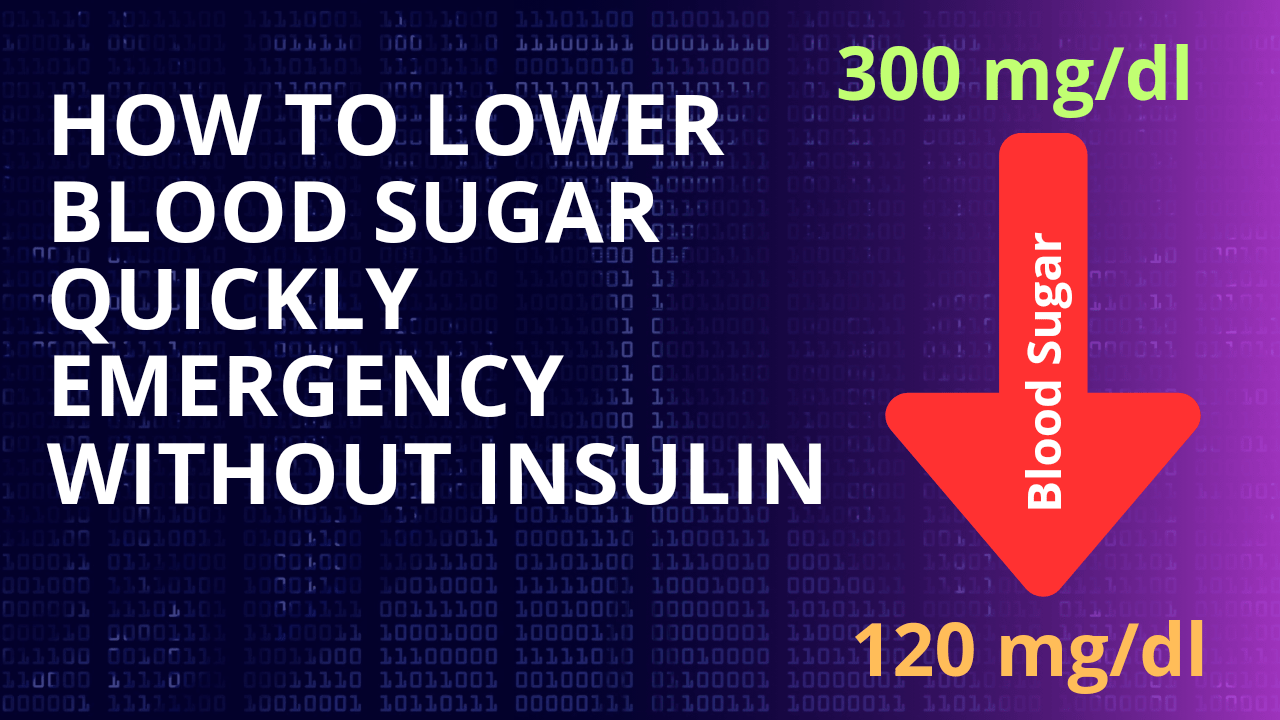Here you will learn “How to lower blood sugar quickly emergency without insulin”.
Blood sugar, also known as blood glucose, is a crucial component of overall health. High and low blood sugar levels can both have serious effects on the body. Blood sugar raise in diabetes mellitus.
High blood sugar levels, also known as hyperglycemia, occur when the body does not have enough insulin or cannot effectively use the insulin it has.The symptoms of DB include increased thirst, frequent urination, and fatigue.
On the other hand, Low blood sugar levels, also known as hypoglycemia, occur when the body has too much insulin or not enough glucose to use.
The symptoms of hypoglycemia may include shakiness, sweating, hunger , seizures, and loss of consciousness.
How to lower blood sugar quickly emergency without insulin at home?
If you are experiencing an emergency situation of hyperglycemia and need to lower your blood sugar quickly without insulin, there are a few steps you can take to bring your sugar levels down.
- Drink water: Drinking plenty of water can help to flush out excess glucose from your system. Aim to drink at least 8-10 glasses of water a day, and increase your water intake.
- Exercise: Physical activity can help to lower blood sugar levels by using up glucose for energy. Even light exercise, such as taking a walk or doing some light stretching, can help to bring your levels down.
- Consume apple cider vinegar: Apple cider vinegar has been shown to help lower blood sugar levels. You can consume it by adding a tablespoon of apple cider vinegar to a glass of water and drinking it.
- Eat low glycemic index foods: Eating foods that are low on the glycemic index can help to slow down the absorption of glucose into your bloodstream. Foods such as whole grains, fruits, and vegetables are good choices. Avoid high-glycemic index foods such as processed snacks, sugary drinks, and white bread.
- Consume fiber-rich foods: Fiber helps to slow down the absorption of glucose into the bloodstream. Foods such as beans, lentils, nuts, and seeds are good sources of fiber.
- How much calorie you need, calculate Here
- Take a hot bath: Taking a hot bath can help to lower blood sugar levels by increasing blood flow and relaxing the body.
- Get enough sleep: Lack of sleep can cause blood glucose levels to rise. Aim for 7-8 hours of sleep each night to help keep your levels under control.
- Manage stress levels: Stress can cause blood glucose levels to rise. Try relaxation techniques such as meditation or deep breathing to help manage stress levels.
Here’s the video of “how to lower blood sugar levels quickly emergency without insulin”.
How hyperglycemia affect the body parts?
The effects of hyperglycemia on the body can be serious if left untreated. Here are some of the ways that hyperglycemia can affect different systems in the body:
- Cardiovascular system: Hyperglycemia can increase the risk of cardiovascular disease, such as heart attacks and strokes. High levels of glucose in the blood can damage blood vessels, making them less elastic and more prone to blockages.
- Nervous system: High levels of glucose in the blood can damage nerves throughout the body, causing a condition called diabetic neuropathy. This can lead to symptoms such as numbness, tingling, and pain in the hands and feet.
- Kidneys: Hyperglycemia can cause damage to the small blood vessels in the kidneys, leading to a condition called diabetic nephropathy. This can eventually lead to kidney failure if left untreated.
- Eyes: High levels of glucose in the blood can damage blood vessels in the eyes, leading to a condition called diabetic retinopathy.
- Immune system: Hyperglycemia can weaken the immune system, making it harder for the body to fight off infections. This can lead to more frequent and severe infections in people with diabetes.
